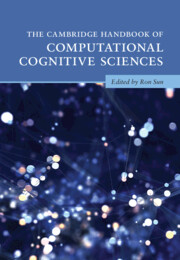Book contents
- The Cambridge Handbook of Computational Cognitive Sciences
- Cambridge Handbooks in Psychology
- The Cambridge Handbook of Computational Cognitive Sciences
- Copyright page
- Contents
- Preface
- Contributors
- Part I Introduction
- Part II Cognitive Modeling Paradigms
- 2 Connectionist Models of Cognition
- 3 Bayesian Models of Cognition
- 4 Symbolic and Hybrid Models of Cognition
- 5 Logic-Based Modeling of Cognition
- 6 Dynamical Systems Approaches to Cognition
- 7 Quantum Models of Cognition
- 8 Constraints in Cognitive Architectures
- 9 Deep Learning
- 10 Reinforcement Learning
- Part III Computational Modeling of Basic Cognitive Functionalities
- Part IV Computational Modeling in Various Cognitive Fields
- Part V General Discussion
- Index
- References
4 - Symbolic and Hybrid Models of Cognition
from Part II - Cognitive Modeling Paradigms
Published online by Cambridge University Press: 21 April 2023
- The Cambridge Handbook of Computational Cognitive Sciences
- Cambridge Handbooks in Psychology
- The Cambridge Handbook of Computational Cognitive Sciences
- Copyright page
- Contents
- Preface
- Contributors
- Part I Introduction
- Part II Cognitive Modeling Paradigms
- 2 Connectionist Models of Cognition
- 3 Bayesian Models of Cognition
- 4 Symbolic and Hybrid Models of Cognition
- 5 Logic-Based Modeling of Cognition
- 6 Dynamical Systems Approaches to Cognition
- 7 Quantum Models of Cognition
- 8 Constraints in Cognitive Architectures
- 9 Deep Learning
- 10 Reinforcement Learning
- Part III Computational Modeling of Basic Cognitive Functionalities
- Part IV Computational Modeling in Various Cognitive Fields
- Part V General Discussion
- Index
- References
Summary
For decades, symbolic models of cognition were the dominant computational approaches of cognition. Today they coexist with subsymbolic, statistical, and hybrid models, but they are still the de facto standard for modeling human reasoning processes. This chapter summarizes important aspects of symbolic and hybrid models of cognition, approaching the topic from different perspectives. After some discussion on historical aspects and the theoretical basis of symbolic models of cognition, cognitive architectures as models for intelligent agents are examined. Subsequently, the role of symbolic computational approaches towards processing natural language, representation of human knowledge, and commonsense reasoning are considered. Then the focus is put on the crucial question of learning new representations and theories, before finally looking at hybrid and neural-symbolic systems combining reasoning and learning and bridging between symbolic and subsymbolic elements.
Keywords
Information
- Type
- Chapter
- Information
- The Cambridge Handbook of Computational Cognitive Sciences , pp. 139 - 172Publisher: Cambridge University PressPrint publication year: 2023
